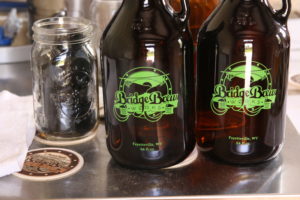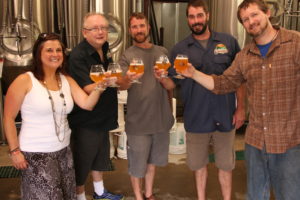By Sophia Ryan
Having clean water is important—especially when it comes to brewing beer. This is why the West Virginia Land Trust (WVLT) is teaming up with local breweries in West Virginia for the clean water collaboration initiative.
WVLT is a statewide nonprofit organization dedicated to protecting West Virginia’s natural lands, scenic areas, water quality, recreational access and historic sites. WVLT helps keep West Virginia’s rivers and streams clean and pristine not only for drinking water and recreational activities but also for brewing the variety of delicious craft beers that have popped up across the Mountain State. In order to raise awareness about the importance of clean water, WVLT has partnered with Bridge Brew Works in Fayetteville to create a series of collaborative beers.

“Clean water is about 98 percent of our material that we use to brew,” says Adam Herrold, a brewer at Bridge Brew Works. “Without it, we simply could not make good beer.”
By working with communities and private landowners, WVLT conserves land that borders local waterways throughout the state.
“Conserving land that borders rivers and streams is the only way to truly protect our water in West Virginia,” says Jessica Spatafore, WVLT’s director of development and communications. “This clean water collaboration initiative is raising a lot of awareness and reaching a broader spectrum of the community. Clean water in West Virginia should be a concern for all of our citizens.”
The New River is a rugged whitewater river located in the Appalachian Mountains of Southern West Virginia, which borders the small, welcoming town of Fayetteville. There, kayakers and nature lovers use the river recreationally, but to Nathan Herrold, co-owner of Bridge Brew Works, it serves a greater purpose. “The river is the main water source for our brewing business, which is why it’s important for it to remain clean and drinkable,” he says.
According to Ken Linch, another co-owner of Bridge Brew Works, water is essential for the brewing process. “That’s where it all starts,” he says.

For West Virginia, the craft beer industry has been growing since 2009 when the state’s Legislature approved doubling the maximum alcohol content limit. With the ability to create more unique beers, Bridge Brew Works is experimenting with a variety of styles, from the popular IPAs and stouts to Weizenbocks and bourbon barrel-aged brews.
Linch believes breweries now have a voice regarding the importance of clean water to the public and those who enjoy craft beer. “People really need to pay attention to clean water and respect our environment, because that’s where craft beer comes from,” he says.
WVLT is thrilled with the partnership with Bridge Brew Works. “Working with Bridge Brew Works has been a hand-in-glove fit,” says Spatafore. “We are really excited about this partnership and the clean water awareness it has brought.”
Recent beer collaborations include the Water Wise-N Bock, which can currently be found on taps around the state, and Seldom Seen Saison. The Weizenbock style was selected for this collaboration because it was traditionally brewed by German monks in December and consumed during Lent.
For more information on great brewery partnerships in West Virginia, check out “Crafty Collaborations” in the Spring 2017 issue of West Virginia Executive!
 About the Author
About the Author
Sophia Ryan is a senior at West Virginia University majoring in strategic communications with an emphasis in advertising. Originally from Kent Island, MD, she has gained a deeper appreciation for West Virginia’s beauty while working as a marketing intern for the West Virginia Land Trust.









